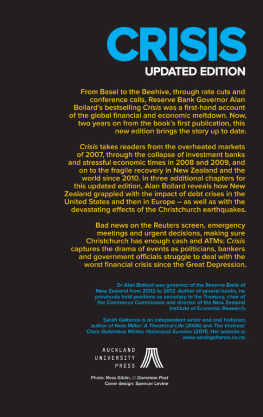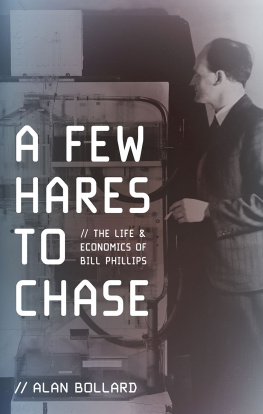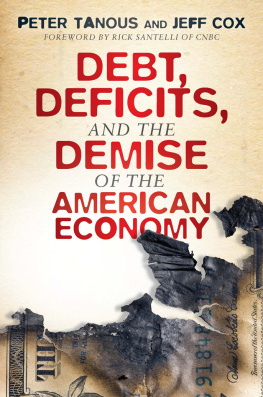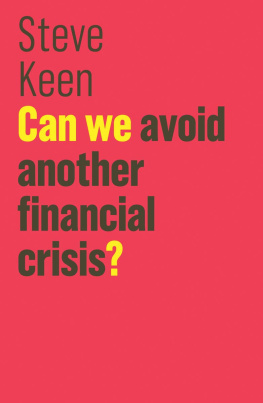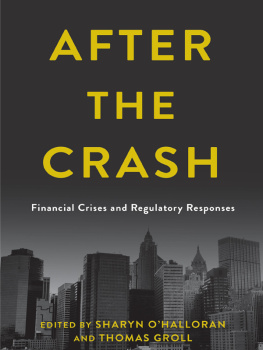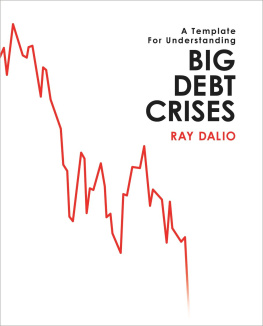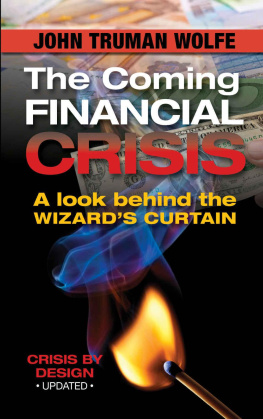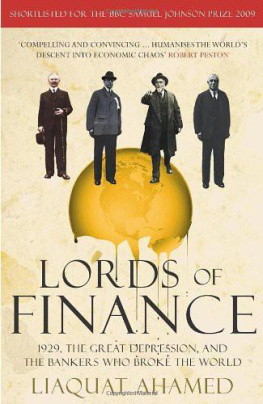CRISIS
ONE CENTRAL BANK GOVERNOR & THE GLOBAL FINANCIAL COLLAPSE
UPDATED EDITION
ALAN BOLLARD WITH SARAH GAITANOS

CONTENTS
1 The End of the Golden Weather
The Background, 19872007
6 From Hong Kong to Basel
December 2008January 2009
PREFACE
Sarah Gaitanos switched off the digital recorder. Weve recorded just over twelve hours, she said. We looked at each other across the table. Theres a fascinating book in there. It was September 2009. Over the past eleven months we had recorded my account of the Global Financial Crisis of 2007 to 2009 for the Reserve Bank oral history archives.
Sarah had originally suggested the idea to Liz Castle, the Reserve Banks Knowledge Centre manager. They saw the value of recording peoples actions and responses to the crisis as it occurred, and thought that my experience as governor would be of interest. They wanted to tell not only the economic and financial story but also to show the human face of central banking. I resisted the idea at first. As the markets closed up around us, we had enough to do without worrying about a record for history. Furthermore, there were times when I did not see how this crisis could be resolved without spilling a lot of blood. In the fog of war, generals do not start writing their reminiscences. Or would these recordings be more like a captain keeping the ships log? Or more ominously a black box in an aircraft to be analysed after the crash?
I was eventually persuaded, and we began. The interviews were soon capturing experiences and raw emotions: worry, angst, occasional expletives. In parts the transcripts read less like an official history and more like a teenagers diary. I sometimes found the recording sessions tense, sometimes cathartic. I felt at the time that they helped me put a narrative on the events and clarify the logic of our responses.
It was another matter when we came to write the book in the first half of 2010. The interviews certainly carried the emotions of the events as they were happening, but we discovered that they were not always reliable about cause and effect or even sequence of events. We rewrote adding new material, checking and restructuring but also tried to keep a sense of real-time drama.
Keeping a record is one thing, but what is a central bank governor doing writing and publishing a book like this, while still in office, while the events are still unfolding? The answer should become apparent in the story that follows. I have had a unique vantage point from which to observe a crisis that should never have happened, to watch the desperate struggle to contain it offshore and, in some way, to assist the efforts to limit its impact on New Zealand.
Observer and participant history brings its own perils. This book does not purport to be the authorised version there are now many publications available on the crisis and this is my own story. It is not the official view of the Reserve Bank of New Zealand. However, I have had privileged access to people and information, though meetings and discussions that were carried out confidentially have remained so in these pages. Many people ministers, senior Treasury officials and senior bankers play crucial roles in the account that follows, and some of them will see things differently. I also had the advantage of many skilled and committed employees in the Reserve Bank of New Zealand working to alleviate the crisis. Again, some may interpret these events differently.
I have also tried to be scrupulous to ensure that I have written nothing on New Zealand that could not have been made public under the Official Information Act; indeed, much of the official policy is already in the public arena. This means that at times the book is less revealing than it might otherwise be. We hope it is no less insightful and interesting.
Crisis aims to provide an accessible account for the lay reader. To achieve this we have tried to minimise use of technical terms, economic data and references. Terminology is New Zealand usage unless otherwise specified. Those seeking clarification or more detail may wish to consult the Reserve Bank of New Zealands website at www.rbnz.govt.nz . A list of further reading on the crisis may be found on page 194.
To paraphrase Einstein, I hope we have tried to make the story as simple as possible but no simpler.
This book was jointly written by my co-author, Sarah Gaitanos, and me. I am indebted to Sarah for her enthusiasm and skill in recording, abstracting, drafting, organising, rewriting, liaising with the publisher and indexing. She has willingly worked around my difficult timetable to help us both meet what looked like impossible deadlines.
I worked on the manuscripts mainly by hand, grabbing time when I could outside my day job. Much of the book was written in late-night or weekend sessions, at airports, on turbulent planes, in hotel rooms. This is not conducive to good handwriting. For transcribing my almost indecipherable script and organising the many drafts, I wish to thank Sandy Anderson, who worked long hours to help put the book together. Many thanks also to Alisa Maxted for typing support; Liz Castle for pushing me to do the interviews; and Elaine Little for transcribing the oral recordings. For data and interpretation I thank Rochelle Barrow, Kirdan Lees, Bevan Cook and other economics staff, as well as Victoria Zhang and David Drage. Special thanks to Grant Spencer, who gave me detailed comments, advice and explanations of what really happened; Ian Harrison for his oversight; Arthur Grimes for guidance; Don Abel for overall help in handling the book; Gary Hawke for many comments; Nick McBride for legal advice; Mike Hannah for assistance with key audiences; and John McDermott for helping me understand the big economic picture.
I wish to thank Sam Elworthy, Anna Hodge, Katrina Duncan, Vani Sripathy and Christine OBrien of Auckland University Press for swift, supportive and skilful publishing and marketing. Thanks to Radio New Zealands concert programmes for aural support, and Tony and Reubens no-name coffee shop for caffeine. I thank Jenny Morel for ideas; I am also grateful to many others outside the Bank who cannot be thanked by name. Royalties from this book will be donated to charity.
In his autobiography, The Age of Turbulence, Alan Greenspan writes, There are errors in this book. I do not know where they are. If I did they would not be there. But with close to two hundred thousand words, my probabilistic mind tells me some are wrong. My apologies in advance. The same applies to me, except that our book is shorter.
Once in a career, an event happens that tests all ones skills and all ones experience. For me, this was the event. We hope you appreciate the story.
Alan Bollard, May 2010
PREFACE TO THE UPDATED EDITION
My hope had been that there would be no second edition of this book, for the simple reason that the Global Financial Crisis would be over. Alas! In this addition we update the ongoing story as economic crises spill over into sovereign debt crises, and attention turns to the sad economies of the eurozone. And that is not all, because the past two years have seen our own domestic dramas too: earthquakes, outages and a mixed recovery.
I have been hugely helped in adding three new chapters to this updated edition by co-author Sarah Gaitanos and chief organiser Jo Lawrence. We repeat our thanks to those named in the first edition, and add Jason Wong and Enzo Cassino. We have not attempted to update views or data in the first part of the book.
For all our sakes let us hope that no third edition will be necessary.

